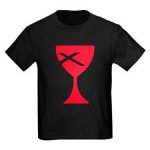I wrote this last week as a guest post for Ed Cyzewski, who is running a “Denomination Derby” on his site. He’s inviting people from different backgrounds to share what makes their denomination unique, and what makes it ‘home’ to the people who stake their faith there. This is my shot at articulating/branding the Disciples of Christ. No, we’re not a cult. Yes, we know our name is ridiculously long (with parentheses even). We are not teetotalers, despite what our logo may look like to outsiders. And yes–we absolutely have a PR problem. It’s been plaguing us for about 200 years…
It pays to have a great conversion story. Some fantastic burning bush moment when God turned your doubt upside down with unavoidable, cosmic certainty; or a drawn-back-from-the-brink story, wherein you abandoned a life of crime/addiction/certain doom for—wait for it—Jesus! If you’re a pastor and you have THAT story, then every sermon for the rest of your life has found its starting point, its center, and/or its conclusion…with your own story.
Too bad I don’t have that story. My story goes more like this: I grew up in a mainline protestant church in small town America. I did Sunday school, vacation Bible school, church camp, mission trips, and youth group, without complaint or resentment. Then I went to college and felt no impulse, whatsoever, to go to church on the weekends. When I got out of college, I started going to church again—different town, same denomination. And like, 5 minutes later, I found myself in seminary classes going, ‘what the hell…?’ I mean, I loved church. I had always loved church. But how it got me on the hook for life, I’ll never know. Maybe it was the Bible school cookies? Or the Pension Fund. Whatever it was, it was no flaming conversion.
The church of my raising was the Christian Church, Disciples of Christ, and that’s where I’ve served a decade-plus of ordained ministry. The Disciples grew out of the Stone Campbell movement in the early 1800’s. The early founders sought an alternative to the divisive denominationalism of that time. They wanted a way to live faith in community without “tests of fellowship,” and with “no creed but Christ.” It was a frontier journey, in more ways than one. Most literally, it was a fellowship that grew out of rural, Central Kentucky—which was the very edge of all that lie ‘west’ of civilized America. But it was also a wilderness outside of polity and strict doctrine. This was to be a place where all were welcome to receive communion; all would be received in baptism; and all could worship together, even if they did not entirely agree on the letter of the law.
How we measure the success of that original movement, these days, is highly subjective. On the one-hand, 200 years of shifting social paradigms have led to several splits. What started as a single, unified church is now 3 different denominations; sometimes we’re speaking to each other, sometimes not. Depends on the day (and what part of the country you’re in). At the same time, the Disciples of Christ, on the whole, can still point to those founding tenets of unity in Christ and freedom of belief at the heart of who we are as church together.
But with all that freedom comes the occasional identity crisis. And what, really, has been a centuries-long marketing nightmare.
“What does your church believe?” a newcomer might ask. “Well…” we venture… “Depends on who you’re talking to. And where you are on the map. And who made the coffee this morning, among other things.”
Most of our congregations affirm and empower women for leadership; but a few still don’t. Some are welcoming of LGBT people; some aren’t. Some embrace a progressive understanding of scripture; but not all. Some of our churches use gender-inclusive language for God, avoid violent imagery of crosses and blood, and are comfortable hearing about social issues from the pulpit. Others… you see where I’m going with this.
When everybody is welcome, doubt is affirmed, questions are encouraged and nobody wants to tell anybody else what to believe… then what in the world do you put on the brochure?? The website? The t-shirt?
True to those ideals of our founders, authority lies within the local congregation. We handle our own money, own our property, hire (and fire) our pastors, select our own leaders, and are not bound by the demands of any hierarchy. Our mission is expressed from the ‘bottom up,’ in that churches support the larger structure for ministry—and not the other way around. That means the local church can hone its own mission statement, set its own vision, find its own way to serve and establish presence in the community… We are guided by the same basic principles, but not bound by them.
It is both wonderful and maddening, all this freedom.
It means we don’t always know how to sit together when we disagree. It means we struggle to navigate the racial tensions, present in the world outside our walls, when we come together within. It means we don’t always know how to share our message ‘out’ there, when we can’t always get it together ‘in’ here. It means it can be hard to focus our energy and our resources to affect real change in the world… when everybody’s idea of ‘change’ is broadly varied, but deeply valued.
Oh, and worship music. Don’t get me started.
The current Disciples identity statement says that “we are a movement for wholeness in a fragmented world.” And the world, as we know it, is indeed fragmented. It is complicated. And the not having of easy answers is, yes, a marketing problem. Because easy answers, proven growth models, and colorful packaged programming is what most folks are in the market for.
Disciples really suck at all that. We always have.
But what we do offer—and always have—is a safe place to live with all that ambiguity. A place where people worship together (however imperfectly) and try to organize for good. A place where ‘movement’ of the collective body, and the Spirit, are valued over any statement of faith; and where the communion table, at the center of worship and community, calls us back to a shared belief in Christ’s love: embodied within us, and made flesh for the world.
That table anchors us, and all that we carry, including the sacred ambiguity of our mismatched selves. Sometimes, sitting at that table together hard work, messy work. Sometimes it’s awkward, sometimes to totally fumble it. And even when it works, it doesn’t work on a bumper sticker.
My own faith story was no flaming conversion… But it was a slow, steady certainty that I belonged at that table. At the center of everything, I had a place, and I had people. For all that we embody different expressions of faith; for all the places I have moved; and for all the turns our collective journey has taken; that table, and the people around it, are the same wherever you go.
Put that on the brochure. It’s the best thing we’ve got.
Find a community near you.












